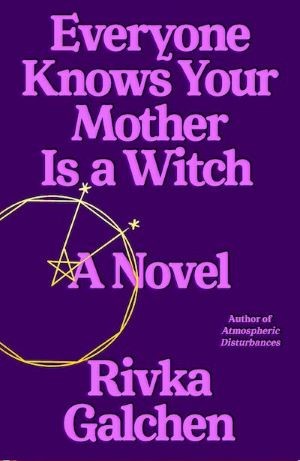This Is Who We Are: Professor Rivka Galchen
This Is Who We Are is a series featuring Columbia School of the Arts’ professors, covering careers, pedagogy, and art-making during a pandemic. Here, we talk with alumna and Assistant Professor of Writing Rivka Galchen '06 about teaching her hybrid seminar last fall, her forthcoming novel Everyone Knows Your Mother Is a Witch, and the fluidity of her writing practice.
I was taking Galchen’s Comedy and Calamity seminar when the severity of COVID-19 became clear last March. At the time, no one knew how long the pandemic might last, but as cases increased and isolation endured, it began to elicit comparisons to historical catastrophes like the Black Plague and the Spanish flu. Galchen ended up adding excerpts from Giovanni Boccaccio’s The Decameron to the class syllabus. The collection of novellas, which contains 100 tales told by a group of ten young people sheltering from the Plague, was in fascinating conversation with the isolation and devastation unfolding across the globe.
The Writing Program moved entirely online for the rest of the spring semester, and that model remained in place, for the most part, in the fall of 2020. Galchen’s hybrid seminar was an exception, one necessitated by the Trump administration’s threat not to let international students into the country unless they had an in-person component to their education. Still, Galchen was happy to teach the class, which was held in the Lenfest Center for the Arts’ sky-lit Lantern space.
Naturally, teaching the hybrid course also came with its challenges. About half of the class was online while the other half was in the room. According to Galchen, “It was difficult and kind of spooky at first…there was this giant film projector for the people who were online, and when they would do their presentations, I was thinking: if they knew how large their head is at this moment, they would be so intimidated.” Galchen also taught a virtual workshop on Zoom. Like many teachers thrust newly into the online environment, Galchen experienced technological bumps. “It was harder for the people online to hear the people in the classroom,” Galchen says. “But for me at least, it really helped maintain a sense of community at a time when that was especially meaningful.”
During this time, Galchen has been at work on several creative projects as well. Currently, she’s writing two science-centered pieces for The New Yorker. “They’re both actually kind of optimistic, consoling pieces,” she says, laughing. She adds, “So I guess it’s not that surprising, but I’m happy to be working on them.” One of the pieces focuses on a clean energy source called nuclear fusion, and the other is about an enormous space telescope, capable of seeing the very first moments of the universe, that will launch in October.

She is also working on a collection of essays about the lives of scientists. Galchen found herself drawn to reading scientific and mathematical biographies, citing their “soothing” quality during a stressful four years. While doing research for that project, Galchen discovered a book about Johannes Kepler’s mother, who was put on trial for witchcraft. She says, “I became obsessed with the story. When I was reading that nonfiction book, I was reading it as if I was going to find out if she really was or wasn't a witch. I thought to myself, that’s so deranged that the story can still produce these feelings, even in a modern person, of wondering what she had done—even as I knew it was impossible that she was a witch. That response to rumor, even across centuries, interested me.”
Galchen became so interested in that emotional response—the desire to know whether Kepler’s mother was guilty or not—that the story became the subject of her latest novel Everyone Knows Your Mother Is a Witch, forthcoming from Farrar, Straus, and Giroux on June 8, 2021. In the book, and in history, Kepler pulls himself away from the celestial world to defend his mother Katharina from the accusation. “The story of how a community becomes implicated in collective aggression and mass hysteria is a tale for our time,” Macmillan’s site states. That aggregate turmoil does resonate especially powerfully after a Trump presidency capped by the pandemic, both of which have stoked fears and encouraged hostility.
Over the years, Galchen’s creative process has changed a lot. She used to have several hours free in the morning before starting work, and she would use that time to write. “I would go to the coffee shop, have my cookies, and try to write. Sometimes it would work and sometimes it wouldn't. But that habit was handy. And I think I was a much faster and more efficient writer then, when I had that habit. And then my domestic life became super crowded, and I didn’t reliably have those hours, so now it’s become sort of whenever possible.”
Still, Galchen manages to cultivate helpful writing conditions. “Some of the most peaceful, excellent concentration I have is when I go to my daughter's soccer practice,” she says. “It’s like two hours, and there’s nothing else to do. I'm looking forward to that today. I have a two-hour, really clean window where I'm not home and I can't see anything or do anything else.” Out in the world, Galchen feels less distracted. “At home, I’m always at risk of looking up a recipe or finding out what happened [in politics] in the past hour,” she says.
The pandemic, which has resulted in the cancellation of so many aspects of daily life, has given Galchen more time to write too. “I have a friend who talks about being like the house that the Dust Bowl didn't hit. I just had so much more time. Normally, I bring my daughter to school, I blink and it's time to pick her up or get to some after school activity. I do the grocery shopping, I cook the dinner. Normally, I'm running all over the place. I usually use the subway like six times a day. Suddenly, I had all this time. So it was a great time for me in terms of writing, which I feel guilty about.”
Galchen’s ability to adapt her creative routine and make the most of her time has served her well over the course of her career. An award-winning fiction writer and journalist, her work appears in The New Yorker, Harper’s, The London Review of Books, and The New York Times. She is the author of four books: Atmospheric Disturbances (FSG, 2008), American Innovations (FSG, 2014), Little Labors (New Directions, 2016), and Everyone Knows Your Mother Is a Witch (FSG, 2021). She is the recipient of numerous prizes and fellowships, including a Guggenheim Fellowship, a Rona Jaffe Fellowship, The Berlin Prize, and The William J. Saroyan International Prize in Fiction. She was included on The New Yorker’s list of 20 Writers Under 40 in 2010. She also holds an MD from Mount Sinai School of Medicine.
To aspiring writers, Galchen says, “Writing is an endurance sport. It’s characterized by a lot of rejection, both external and internal, like you yourself look at your work and lose heart sometimes. Most people aren't trying to write unless they love it and they have an intimate relationship to language and storytelling. So I sort of assume that people aren't trying to become writers unless the field is a pretty good fit for them. Being a writer as a profession is all about becoming almost delusionally indifferent to serial rejection and failure.”
